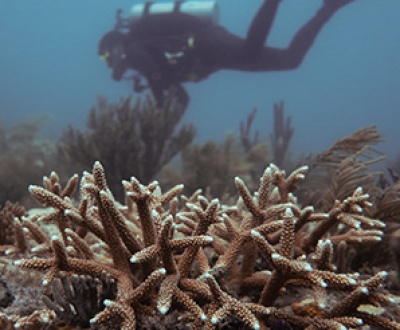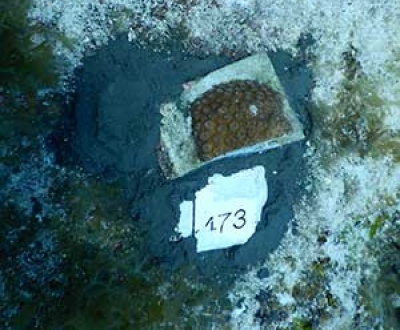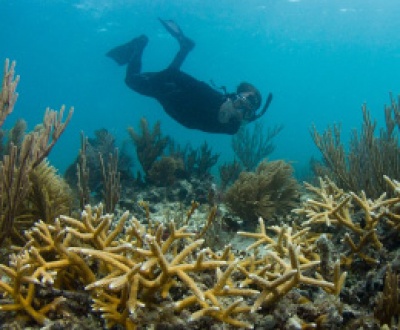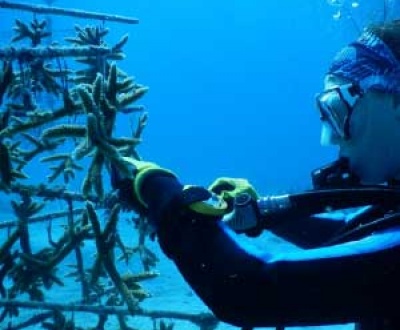Active coral restoration efforts are expanding as the state of coral reefs continues to decline in South Florida. In the past two decades, coral restoration practitioners have implemented both engineered and ecological approaches to combat these losses, such as artificial reefs and coral gardening. A new program, “Reefense”, has been established to combine the best methods of grey (artificial reefs) and green (corals and other reef organisms) techniques into a novel hybrid approach for coral reef restoration and coastal protection.
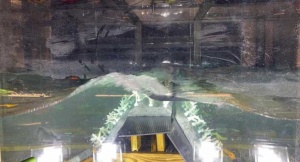
Green x Gray coral models being tested in the University of Miami SUSTAIN (SUrge-STructure-Atmosphere Interaction) Laboratory’s hurricane simulator.
The Reefense program is part of the Defense Advanced Research Projects Agency (DARPA), created over 60 years ago by the Department of Defense with the goal of investing in breakthrough technologies that will benefit national security (yes, reefs also contribute to national security!). This particular program seeks to develop a hybrid engineered and biological reef structure that will be self-healing and mimic natural structures that provide protection from wave impacts, coastal flooding, and storm damage. This artificial reef will be designed in such a way that it will reduce wave energy and promote the settlement and growth of key reef-building organisms. Recruitment of organisms will be enhanced, ensuring that the structure is able to self-repair and recover if disturbed.
Our project began in June 2022 with a team, led by the University of Miami, composed of over 20 scientists from 11 different institutions working together to create and test this hybrid reef here in South Florida. The entire program will extend over a 5-year span with the development, testing, and deployment of a 100-m artificial reef structure likely in front of a naval installation. Similar projects were funded in Hawaii (coral reefs) and Florida (oyster reefs).
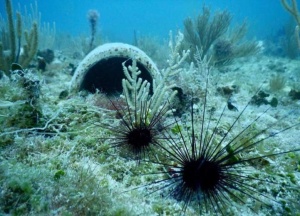
Deployment of Diademan antillarum (long-spined sea urchin) to test retention and grazing on the reef.
Proposed research activities for the project include tasks such as assisted coral recruitment, community enhancement through the addition of aquacultured sea urchins and crabs, selective breeding of corals from high temperature environments (to select for “warm genes”), and microbiome manipulations and larval conditioning to enhance coral larval success. Some of these activities include advanced technology that is being utilized in Florida reefs for the very first time! Using these never-before-seen techniques, the artificial reef will be populated with heat- and disease-resistant corals that will withstand the changing environment and future impacts of climate change.
Unfortunately, this program is not a long-term solution to the loss of coral cover here in South Florida. While this hybrid reef structure has the potential to protect portions of coastlines, coral ecosystems as a whole must still withstand sea level rise and other human-induced stressors. These issues need to be mitigated in order to allow for coral reef recovery. The goal of the Reefense program is to provide an opportunity for critical research of coral restoration and how to help reefs survive the climate crisis. Reefense structures will provide immediate coastline protection and open the door for reef restoration practitioners to new and advanced coral restoration technology.

Graphic representing the design of the underwater structure for the artificial reef.
Emily Esplandiu
Research Associate
University of Miami Rosenstiel School
About the Author
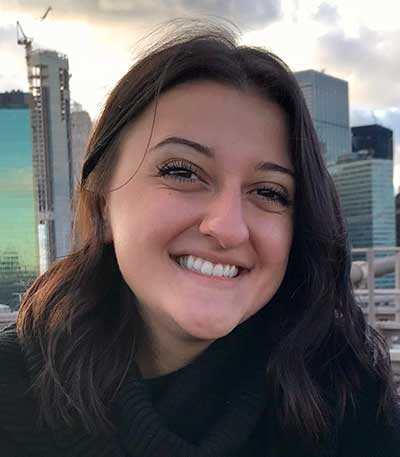
Emily Esplandiu
Emily Esplandiu is a Research Associate in Dr. Diego Lirman's Coral Restoration Lab at the University of Miami Rosenstiel School where she studies the benefits and impacts of coral restoration efforts on the reef ecosystem as a whole.
She received her Master of Science degree in Marine Biology and Ecology in 2022 from the University of Miami with a focus on coral restoration impacts on reef communities. In addition to working as a research associate, Emily works as a Field Team Lead for the Reefense project through DARPA.
Emily grew up in Ohio and hopes that more people, especially those who do not live next to the ocean, understand the importance of coral reefs and appreciate their beauty as much as she does.
Sign up here for email notifications about new Hothouse Blog articles!
More articles on the subject
See all postsRecent Posts
- April 2023 April 1, 2024
- Good News on Environmental Plastics February 1, 2024
- Material World / Plant World January 1, 2024
Leave a Comment cancel
This site uses Akismet to reduce spam. Learn how your comment data is processed.



